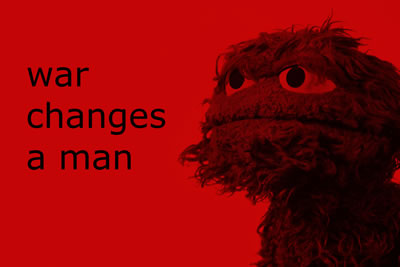This is the article that I wrote that was published in the most recent issue (Volume 17, Number 1-2) of
The Person-Centered Journal, which is a publication produced by
the Association for the Development of The Person-Centered Approach ("ADPCA"). This article is based on a workshop that I gave at the annual ADPCA conference of 2009. This article, publication, and organization is all based on
"the person-centered approach", which comes out of the work of the renowned humanistic psychologist
Carl Rogers.
--------------------------------------
Nonviolent Communication:
Tools and Talking-Points for Practicing the Person-Centered Approach
Ian Mayes
Camphill Soltane, Glenmoore, PAI see the process of Nonviolent Communication (aka “NVC”) as being a set of tools to aid one in practicing the Person-Centered Approach (aka the “PCA”) within interpersonal relationships. The great value of NVC as I see it is that it enables one to take the PCA, which is usually looked at in a very theoretical way, and make it into a very practical thing that anyone can do. I see great potential for Nonviolent Communication being used to assist in the real-life applicability of the Person-Centered Approach in more and more diverse situations.
I will briefly examine here some of the key points of the Person-Centered Approach, with a particular emphasis on Carl Rogers’ 1956 document entitled “The Necessary and Sufficient Conditions of Therapeutic Personality Change”, and relate each to their complementary practices that exist within Nonviolent Communication.
The Origin of Nonviolent CommunicationNonviolent Communication was first developed by a man named Marshall B. Rosenberg Ph.D. Rosenberg was a student of Carl Rogers at the University of Wisconsin-Madison during the 1957–1963 time-period. Rosenberg cites Rogers as being a major influence in the development of his work. Towards the end of their time together they were also colleagues working on the Wisconsin Project. In 1966 Rosenberg was awarded diplomate status in clinical psychology from the American Board of Examiners in Professional Psychology.
The process of Nonviolent Communication came into being through Marshall Rosenberg’s work in the 1960’s providing mediation and communication skills training for communities working to peacefully desegregate schools and other public institutions. In the 1980’s an organization was created, the “Center for Nonviolent Communication”, to provide structure and coordination for all of the Nonviolent Communication training that was taking place worldwide.
Applying Nonviolent Communication practices to Carl Rogers’ six “Necessary and Sufficient Conditions of Therapeutic Personality Change”Here is what Carl Rogers wrote about the necessary and sufficient conditions of therapeutic personality change:
“For constructive personality change to occur, it is necessary that these conditions exist and continue over a period of time:
• Two persons are in psychological contact.
• The first, whom we shall term the client, is in a state of incongruence, being vulnerable or anxious.
• The second person, whom we shall term the therapist, is congruent or integrated in the relationship.
• The therapist experiences unconditional positive regard for the client.
• The therapist experiences an empathic understanding of the client's internal frame of reference and endeavors to communicate this experience to the client.
• The communication to the client of the therapist's empathic understanding and unconditional positive regard is to a minimal degree achieved.
No other conditions are necessary. If these six conditions exist, and continue over a period of time, this is sufficient. The process of constructive personality change will follow.”
I will now elaborate on how Nonviolent Communication provides specific practices and means to assist one in creating each of these six conditions mentioned above. I will begin by discussing the three conditions which Rogers refers to as the “core conditions”, which are “authenticity, empathy, and unconditional positive regard”.
Authenticity Nonviolent Communication has two practices to help bring out authenticity (aka “congruence”) within a relationship. The first is what is called “self-empathy”. This consists of stopping and asking yourself what you are feeling and what you are needing within a given situation. It is a form of “giving yourself empathy”, genuinely listening to yourself to discover what your emotional feelings really are and what needs are motivating them.
The second practice is referred to as “honest expression”. Traditionally this is presented as someone first saying what is observed (ie, what is specifically said or done) without any evaluation or interpretation mixed in. Then the speaker says what feelings and needs come alive for them when that observation happens. This expression of one’s own feelings and needs is where it is useful, perhaps even essential, for the speaker to go through a self-empathy process first before honestly expressing to the other person. Finally the speaker gives a clear and doable request to the other person describing what specifically could be done to better meet the needs expressed.
EmpathyThe practice of empathy within Nonviolent Communication consists of attentively listening to someone with an active curiosity towards what the speaker could possibly be feeling and needing. This kind of listening could be done silently, or it could involve verbalizing guesses of possible feelings and needs to ask the speaker.
Within Nonviolent Communication empathy is something that is focused on to such a great extent that it exists as a specific practice that NVC practitioners often arrange to set aside specific times to practice exclusively. In addition to this empathy is also seen as an element that can exist within all interpersonal interactions, the presence of which it would be beneficial to increase. The NVC practice of empathic listening (often referred to as “giving empathy”) is explicit, intentional, learnable, and resources are available to support the development of this skill.
New social forms have developed within the NVC community to support people’s empathic listening skills. For example, there is the “empathy buddy” one-on-one partnership relationship where individuals take turns empathically listening to the other person and being empathically listened to. There is also the “empathy group” relationship where a whole group of people takes turns empathically listening to an individual.
Unconditional Positive RegardAn important differentiation within Nonviolent Communication is that of “heart-open” and “heart-closed.” In other words, “is your heart open or is it closed?” The phrase “heart-open” is synonymous with “unconditional positive regard”, whereas “heart-closed” is synonymous with “conditional positive regard”. Various practices within Nonviolent Communication exist and are being developed that one can apply to discern whether one’s heart is open or closed.
If one is holding judgments of another person, if one’s regard is given “conditionally”, then there is a process within NVC called the “Translating Enemy Images” process. This process involves learning what your judgments are of another person, seeing what demands you may hold of them and what your thought process looks like there. Then the NVC process of discerning the “Observations”, “Feelings”, and “Needs” is used – applied to both yourself as well as in guesses as to the situation of the person whom is being judged. Eventually through the use of this process the judgmental thinking (aka “enemy images”) is transformed into greater clarity and care for both yourself and the other person.
Another practice of unconditional positive regard is expressions of gratitude and appreciation to another person. These expressions can be aided with the NVC process through containing within the expression reference to the actions that have been done, the specific needs that have been met by these actions, and the positive feelings that arise as a result of all of this.
The Client’s Perception of the Core ConditionsThere is a means within Nonviolent Communication to gain a sense as to whether the person you are interacting with perceives you as being authentic, empathic and caring. This is through using what are referred to as “connection requests”. These kinds of requests are focused primarily on the relationship itself in the present moment. Examples of connection requests can be things like “how do you feel hearing me say that?”, “can you tell me back what you just heard me say?”, “do you trust that I mean what I’m saying here?”, etc. Based on how the person replies to these you then have more information to work with to better access whether the other person perceives the core conditions as being present within the relationship.
Anxiety and Fear in the ClientOne concept that is used within Nonviolent Communication is that of “edges” and “working with your edges”. An “edge” is the area where one’s comfort regarding looking at and talking about a personal matter suddenly shifts. This is where a personal area then becomes “too personal”, “too dangerous”, “scary”, etc. The “edge” is where one’s “comfort zone” meets “out of one’s comfort zone”. Various practices exist to identify these areas and to experiment with them.
Another concept and practice within Nonviolent Communication is referred to as “walking towards your fear”. This is done through first identifying something which one is habitually afraid of and then identifying a specific individual who epitomizes that which one is afraid of. After that is done then one approaches that specific individual and initiates a conversation with them. Throughout this conversation one tries as best one can to be authentic, empathic and caring, while also offering clear doable requests for what could be done to improve things.
A third concept within Nonviolent Communication that is related to this area is that of “scary honesty”. What this refers to are those things that are on one’s mind and one is aware of, but which one is too afraid to verbalize. Saying what is on one’s mind here would be honest, but it is also “scary” to do so. Developing a practice of conjuring up the courage necessary and then proceeding to say these things is engaging in a practice of “scary honesty”.
Psychological ContactWhat is referred to by Carl Rogers as “psychological contact” is referred to in Nonviolent Communication as “heart-felt connection”. Within NVC establishing “connection” is highly valued, with many practitioners seeing it as being the entire purpose of it all. To quote the renowned NVC trainer Robert Gonzales:
“The primary intention of NVC is to create a quality of connection in which everyone’s needs are equally valued and met through natural giving.”
Similar to the other qualities mentioned above, various practices exist within NVC to discern and strengthen the quality of connection between individuals.
Additional Person-Centered Approach Key Concepts
The Actualizing TendencyNVC has a core belief that everything that people do is an attempt to meet some kind of fundamental human need. A fundamental human need is distinct from a strategy to meet needs, in other words, it is independent of any particular person, place, thing, or action. For example, “love”, “acknowledgement”, “understanding”, “accomplishment”, “belonging”, etc. are fundamental human needs, whereas “Mr. Smith”, “sitting next to me”, “reading a book”, “winning the prize”, “having a membership card” are all strategies to meet needs and are not considered needs themselves.
The actualizing tendency can be seen then as being the basic drive that each person has to meet needs. The actualizing tendency is not the same thing as fundamental human needs, it is instead the basic urge that one has to have needs met. I believe that viewing things this way helps to give a clearer picture of how the actualizing tendency interacts with our day-to-day life.
Personal PowerI see Nonviolent Communication as relating with personal power in two ways. First, it strengthens the ability of each person to see the world in terms of concrete observations and doable requests that are separate and distinct from interpretations and evaluations. Seeing the world as it is apart from people’s thoughts about it I believe helps one to have more of a full understanding as to what actually exists that could be used to potentially meet needs. Secondly, NVC strengthens the ability of each person to be aware of the moment-by-moment choices that they make as attempts to meet particular needs. Once one is aware of which needs one wants to have met in a given situation, then one can re-evaluate one’s course of action and chose that which they think is most likely to result in those needs being met.
Nonviolent Communication as a Modern PC Approach
TeachableThere are very specific places to focus one’s attention on. For example, you can focus on “observations”, “feelings”, “needs”, or “requests” in a number of different ways. You can focus on them in terms of how they relate to you in the present, past, or future, or in terms of another person, or you can focus on them in terms of the thoughts that you have about another person. With the assistance of a skilled practitioner one’s attention can be repeatedly directed to areas where NVC concepts and practices can be applied.You can also break NVC down into bite-size “chunks”. For example, “observations”, “feelings”, “needs”, or “requests” can each be focused on individually until one feels comfortable enough with each concept before proceeding on to another one. One does not need to fully understand the other concepts in order to find value in working with one of them.
LearnableThere are specific step-by-step processes that can be applied for practice and learning. These processes can be gone through repetitively until one develops new habits around using them. Also, each step can be checked to make sure that it is actually accomplished correctly. For example, there are ways to check to make sure that a request is actually a request, to check that an observation is actually an observation, a need a need, etc.
DemonstrableThe Nonviolent Communication process can be embodied at will by people who are trained in it and who make the choice to use it. Situations where the process is demonstrated by one or more persons using the NVC process can be role-played by people trained in it.
An Invitation to YouFor the sake of developing your own skill and proficiency in creating the six conditions that Rogers spoke of as being necessary for constructive personality change, I invite you to investigate more about Nonviolent Communication.
Referencesd'Ansembourg, Thomas. (2007).
Being Genuine: Stop Being Nice, Start Being Real. Encinitas, CA: Puddledancer Press.
Rogers, Carl. (1989). The Necessary and Sufficient Conditions of Therapeutic Personality Change.
The Carl Rogers Reader. Mariner Books.
Rogers, Carl. (1967).
The Therapeutic Relationship and Its Impact: A Study of Psychotherapy with Schizophrenics. The University of Wisconsin Press.
Rosenberg, Marshall. (2003).
Life-Enriching Education: NVC Helps Schools Improve Performance, Reduce Conflict and Enhance Relationships. Encinitas, CA: Puddledancer Press.
Rosenberg, Marshall. (2003).
Nonviolent Communication: A Language of Life. Second Edition. Encinitas, CA: PuddleDancer Press.




